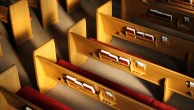
Over the past decade, media reports have described rising popular interest in New Age practices such as astrology, tarot card reading and fortune-telling. These practices are frequently associated with young people, and they have developed their own social media cultures on TikTok and other platforms, especially during the period of social distancing brought on by the COVID-19 pandemic. So, how popular are these practices, and why do Americans engage in them?
A fall 2024 Pew Research Center survey finds that 30% of U.S. adults say they consult astrology (or a horoscope), tarot cards or a fortune teller at least once a year, but most do so just for fun, and few Americans say they make major decisions based on what they learn along the way.
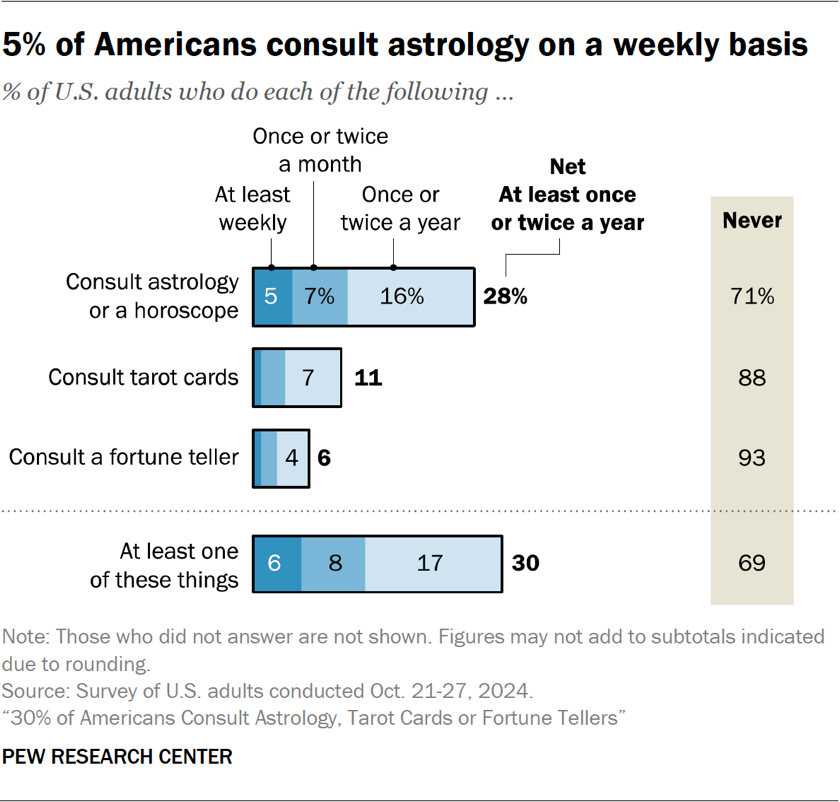
Here are other key takeaways from the nationally representative survey of 9,593 U.S. adults.
Despite recent attention to astrology, the number of Americans who believe in astrology doesn’t appear to have changed very much in recent years. On the new survey, 27% of U.S. adults say they “believe in astrology (the position of the stars and planets can affect people’s lives).” That is not significantly different from what we found when we asked an identical question in 2017 (29%). And, although the results of earlier surveys may not be directly comparable because of differences in methodology, Gallup polls from 1990 to 2005 consistently found that between 23% and 28% of Americans believed in astrology.1
On most questions we asked about these practices, there are big differences by age and gender. Younger adults – and especially younger women – are more likely to believe in astrology and to consult astrology or horoscopes. For example, 43% of women ages 18 to 49 say they believe in astrology. That compares with 27% of women ages 50 and older, 20% of men ages 18 to 49, and 16% of men who are 50 and older.
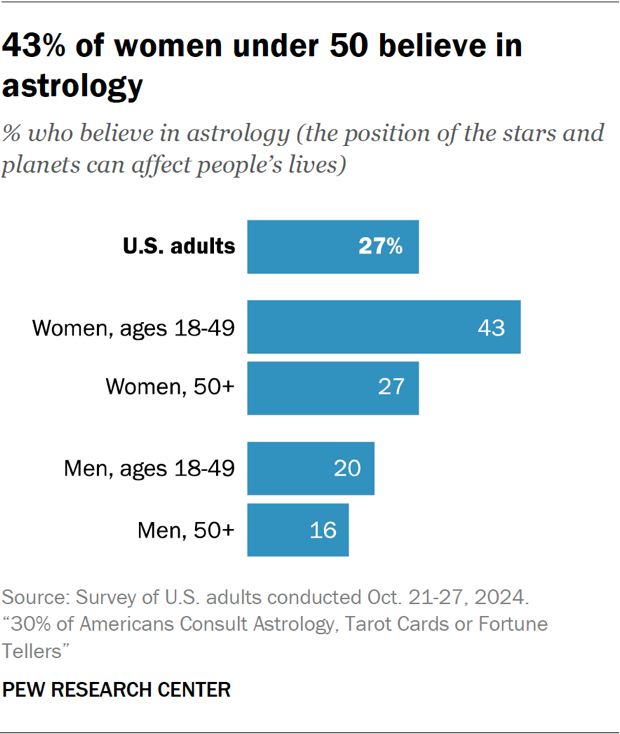
Americans who identify as lesbian, gay, bisexual or transgender (LGBT) are especially likely to consult astrology or a horoscope, and tarot cards.2 About half of LGBT Americans (54%) consult astrology or a horoscope at least yearly – roughly twice the share among U.S. adults overall (28%). And LGBT women are more likely than LGBT men to consult astrology at least yearly (63% vs. 40%).
In addition, 33% of LGBT adults say they consult tarot cards – making them three times as likely as U.S. adults overall to say this (11%). And 21% of LGBT Americans say that when they make major life decisions, they rely at least a little on what they’ve learned from astrology or a horoscope, tarot cards, or a fortune teller. While there is limited academic research on the topic, media publications focused on LGBTQ+ issues have described the prevalence of New Age practices in the LGBTQ+ community.
Yet, most Americans who engage in astrology, tarot cards or fortune-telling say they do it for fun, rather than for insights or guidance on life decisions. Overall, 20% of U.S. adults say they engage in at least one of these activities mostly “just for fun,” while 10% say they do them mostly because they “believe the practices give them helpful insights.”
Relatively few Americans make major life decisions based on what they learn from astrology, tarot cards or fortune tellers. Just 1% of U.S. adults say they rely a lot on what they have learned from these practices when making major life decisions. An additional 5% say they rely a little on what they have learned.
Fewer than one-in-ten Americans engage in these practices on a weekly basis. While there are now abundant ways – both online and in person – to consult a horoscope, tarot cards and fortune tellers, just 6% of Americans report that they participate in one or more of these activities at least weekly. More (14%) say they engage monthly in at least one of these practices.
Read on to learn more about how different demographic groups answer questions about:
- Belief in astrology
- Consulting astrology or horoscopes, tarot cards, and fortune tellers
- Engaging in these practices for fun versus for insight
Belief in astrology
Religiously affiliated Americans and religiously unaffiliated Americans are equally likely to believe in astrology (27% and 28%, respectively).
(Religiously unaffiliated Americans are those who identify religiously as atheist, agnostic or “nothing in particular.”)
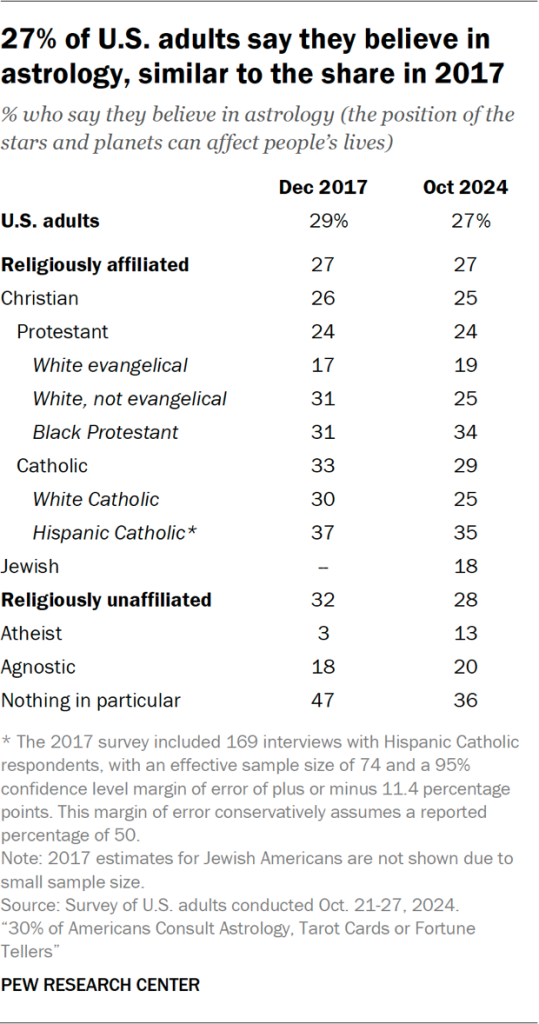
But some religious groups are especially likely to believe that the position of stars and planets can affect people’s lives.
About one-third or more of Black Protestants, Hispanic Catholics and adults who say their religion is “nothing in particular” say they believe in astrology.
On the other hand, atheists, agnostics, White evangelical Protestants and Jewish Americans are less likely than the general public to say they believe in astrology.
The survey included respondents of many other religious backgrounds, including members of the Church of Jesus Christ of Latter-day Saints (widely known as Mormons), Muslims, Hindus and Buddhists. But there are not enough respondents from these smaller groups to report on their answers separately.
Views among demographic subgroups
More advanced statistical analyses show that belief in astrology also varies significantly across demographic categories. We ran regression analyses to examine the independent effects of a number of factors – including gender, age, race, educational attainment, political party, ideology, income level, region, and LGBT identity – on belief in astrology while holding all else equal.

In addition to differences by religion, there are sizable gaps across the following demographic categories:
- Gender: Women are about twice as likely as men to believe in astrology (35% vs. 18%). Women ages 18 to 49 are especially likely to express belief (43%).
- Age: Americans under 65 are more likely than adults 65 and older to believe in astrology.
- LGBT identity: LGBT adults are much more likely than adults who are not LGBT to believe in astrology (43% vs. 26%).
- Income: U.S. adults with lower incomes are about twice as likely as adults in the upper-income category to believe in astrology (37% vs. 16%).
- Ideology: Americans who identify as politically conservative are less likely than moderates and liberals to believe in astrology.
- Education: U.S. adults without college degrees are more likely than college graduates to believe in astrology.
- Race and ethnicity: Black Americans are more likely than White and Asian Americans to believe in astrology.
Belief in astrology among these demographic subgroups has changed little since we asked this question in 2017. A slight decline among political conservatives (4 percentage points) is the only difference that is statistically significant.
Consulting astrology or horoscopes, tarot cards, and fortune tellers
The share of Americans who say they consult astrology or a horoscope at least once or twice a year (28%) parallels the share who say they believe in astrology (27%).
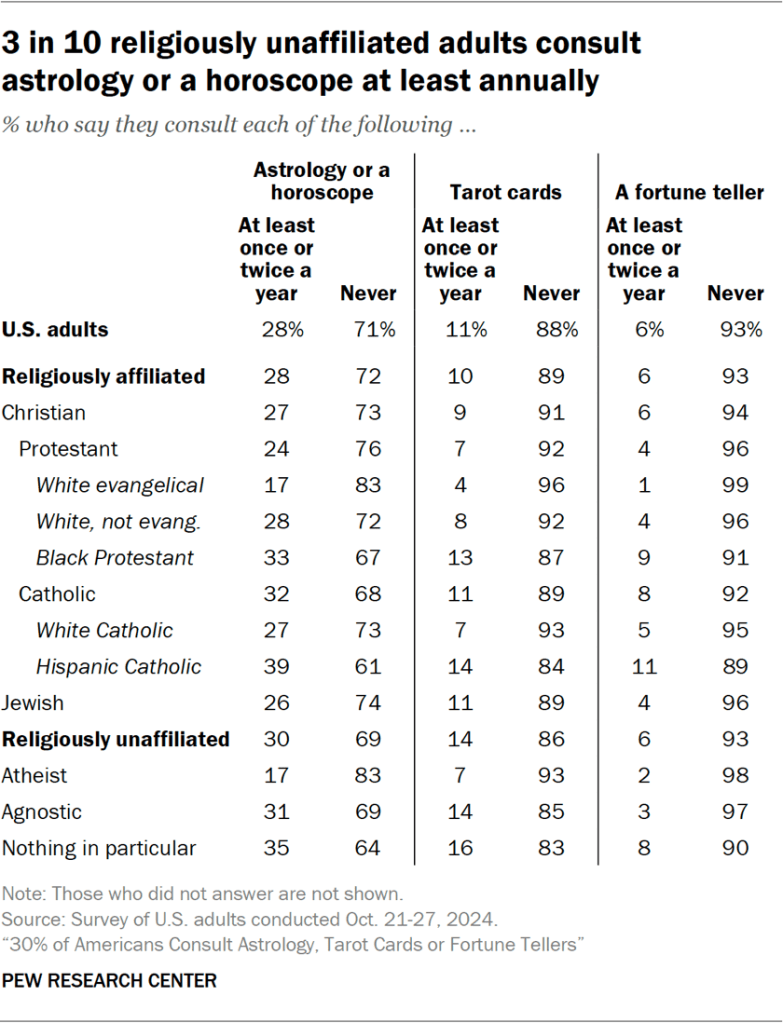
Hispanic Catholics (39%), Black Protestants (33%) and adults who say their religion is “nothing in particular” (35%) are among the most likely to say they consult astrology at least annually.
About one-in-ten Americans consult tarot cards at least annually. On the whole, religiously unaffiliated Americans are slightly more likely than religiously affiliated Americans to say they consult tarot cards at least yearly (14% vs. 10%). But this is primarily due to the use of tarot cards by agnostics and people who say their religion is “nothing in particular,” rather than by atheists.
Religious differences in consulting a fortune teller are not very pronounced.
When asked about consulting astrology or a horoscope, tarot cards, or fortune tellers, White evangelicals and atheists are among the groups that are most likely to say they never engage in the practices.
Views among demographic subgroups
About half of LGBT adults (54%) say they consult astrology or a horoscope at least annually.
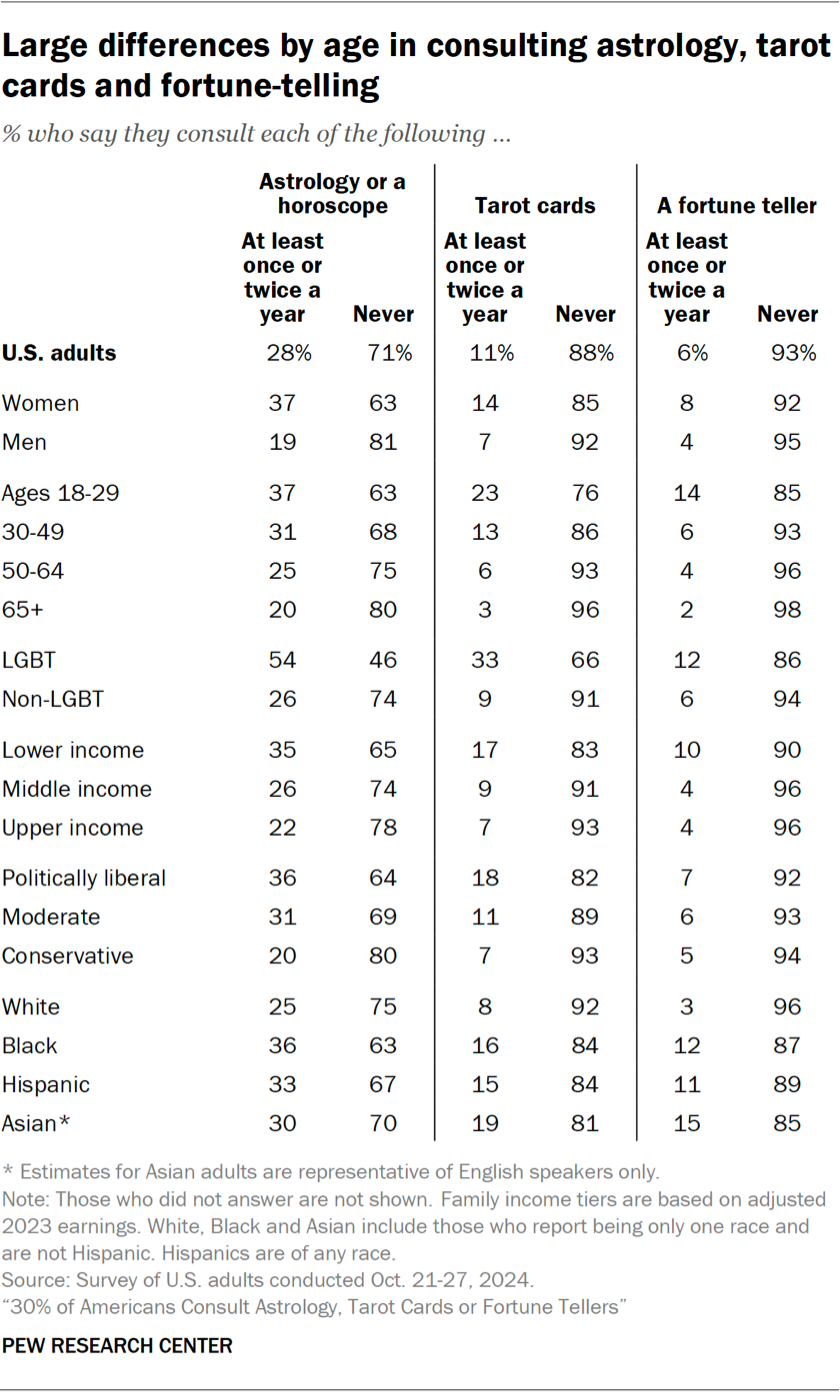
Also, 37% of women say they do this at least once a year – a figure that rises to 46% among women ages 18 to 49.
Americans in lower-income households are more likely than those in upper-income households to say they consult astrology annually – as are those who describe themselves as politically liberal, compared with self-identified conservatives.
While religious groups in this analysis generally don’t differ much in their propensity to consult tarot cards, there are relatively large differences by LGBT identity, gender and age.
LGBT adults are about three times as likely as non-LGBT adults to report consulting tarot cards at least annually (33% vs. 9%). And 15% of LGBT adults say they consult tarot cards at least once or twice a month. (Refer to the detailed tables for more information about how often people in different demographic groups say they engage in these practices.)
Nearly a quarter of Americans ages 18 to 29 say they consult tarot cards at least annually, compared with just 6% of Americans ages 50 to 64 and 3% of Americans who are 65 and older. There are also differences by gender, income level and political ideology, though no more than about a third of adults in any demographic group we have analyzed say they consult tarot cards at least yearly.
Consulting a fortune teller is also relatively rare among all the groups in this analysis, though there are some notable differences by age, and by race and ethnicity. For example, 14% of U.S. adults under 30 say they consult a fortune teller, compared with 2% of those ages 65 and older. And 15% of Asian Americans say they consult a fortune teller at least yearly, compared with 3% of White Americans. Overall, 6% of U.S. adults consult a fortune teller at least once or twice a year.
Engaging in these practices for fun versus for insight
A majority of U.S. adults who engage in at least one of these three practices say they do so mostly “just for fun,” rather than because they “believe the practices give them helpful insights.”
That said, Hispanic Catholics, Black Protestants and adults who say their religion is “nothing in particular” are among the most likely to say they believe that consulting a fortune teller, tarot cards or astrology gives them helpful insights.
Overall, 16% of Hispanic Catholics and 14% of Black Protestants say they engage in these practices mostly for helpful insights and not just for fun.
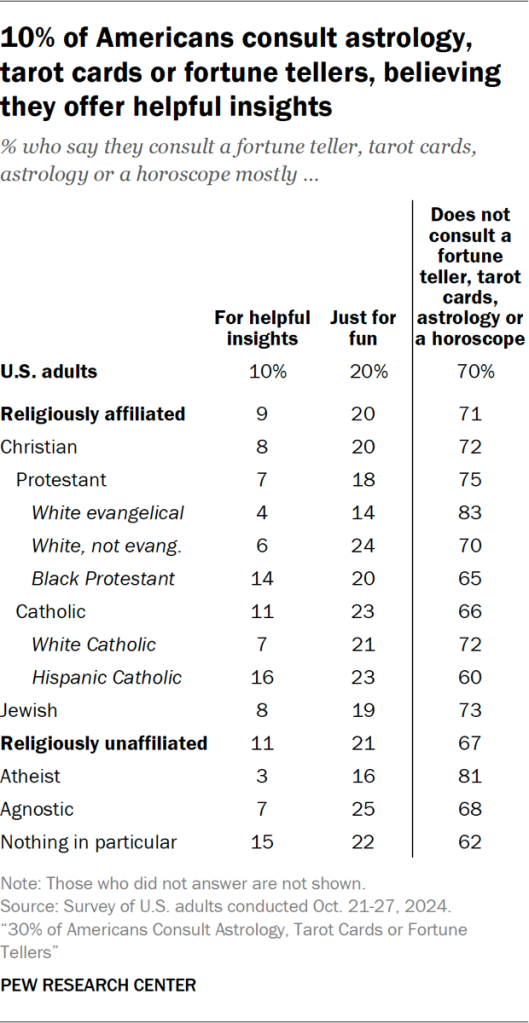
When asked why they take part in these practices, LGBT adults once again stand out. They are the most likely of all the demographic subgroups analyzed in the survey to say they consult fortune tellers, tarot cards or horoscopes to obtain helpful insights (29% do this).
Nearly one-in-five Black Americans and Americans ages 18 to 29 also say they engage in these practices for helpful insights.
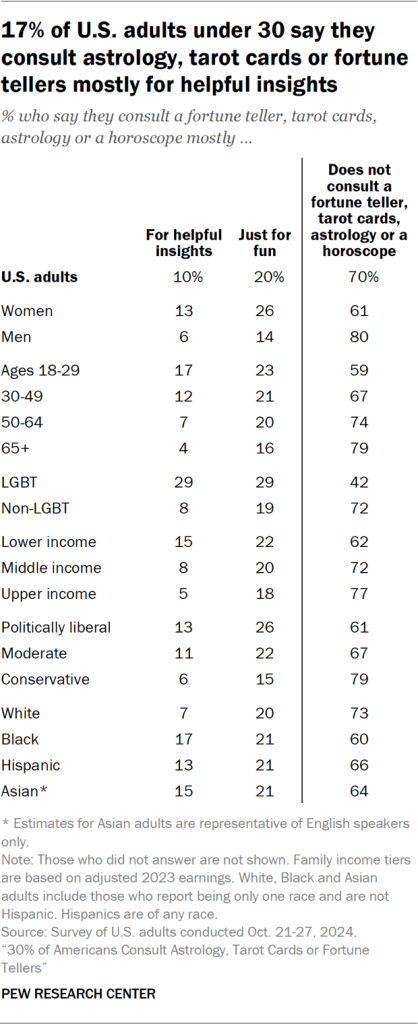
Making major life decisions based on these practices
Respondents who said they use at least one of these three practices mostly to gain helpful insights were asked an additional question: “When you make major decisions about your life, how much do you rely on what you’ve learned from a fortune teller, tarot cards, astrology or a horoscope?” The response options were “A lot,” “A little” or “Not at all.”
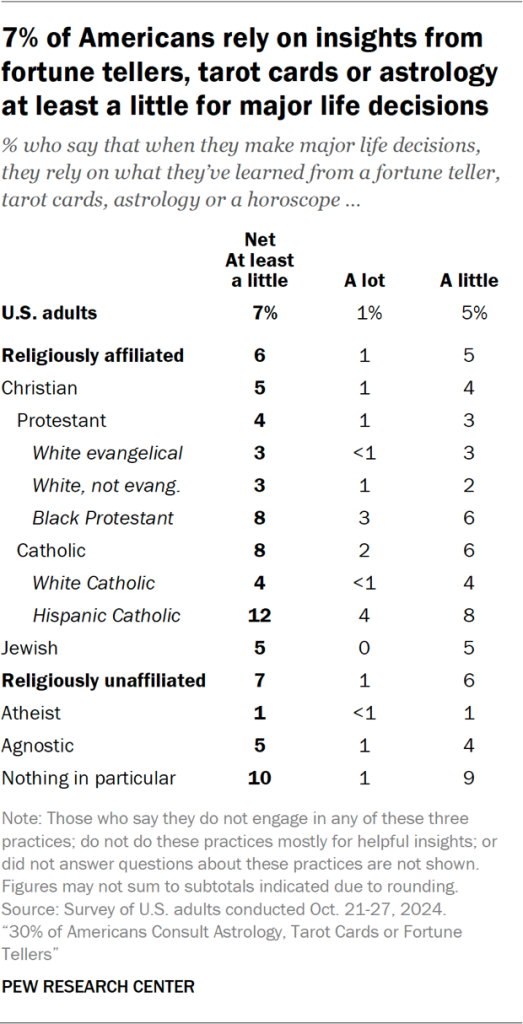
Just 1% of Americans say they rely on insights from these practices a lot when making major life decisions, and an additional 5% say they rely on them a little.
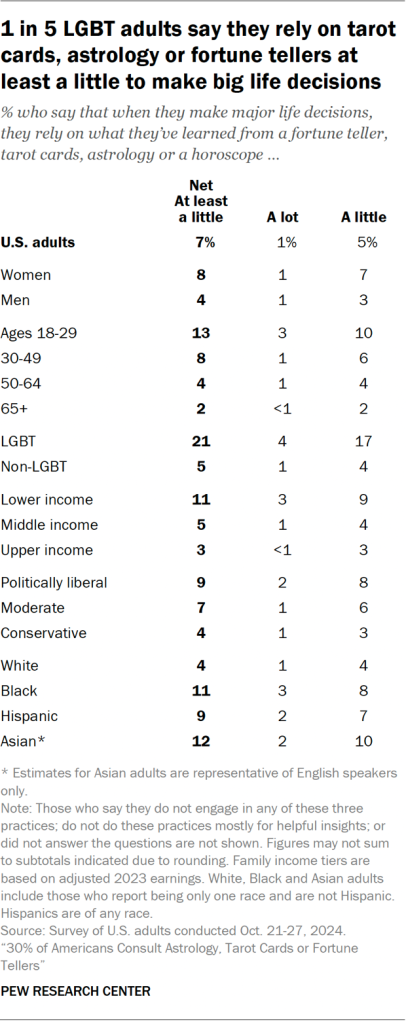
Hispanic Catholics (12%) are more likely than most other religious groups to say they rely on insights from these practices at least a little when making major life decisions.
About one-in-five LGBT adults (21%) say that when they make major life decisions, they rely at least a little on what they’ve learned from a fortune teller, tarot cards, astrology or a horoscope. This is considerably larger than the share of any other demographic subgroup that says this.
Younger Americans (13%), people with lower incomes (11%) and Americans who are ideologically liberal (9%) are somewhat more likely than their counterparts (i.e., older, upper-income and ideologically conservative Americans, respectively) to say they rely on insights from a fortune teller, tarot cards, astrology or a horoscope when making major life decisions.
Likewise, Asian (12%), Black (11%) and Hispanic (9%) Americans are somewhat more likely than White Americans (4%) to rely on insights from these practices when making major life decisions.




